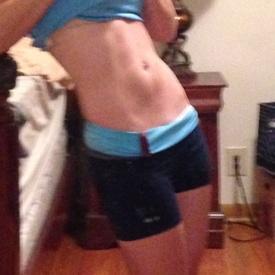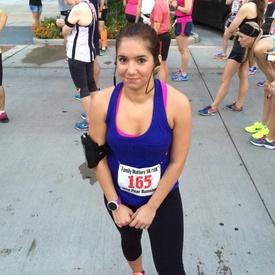I don't think its what you eat, its how much you eat.

madxprofessor
Posts: 81 Member
I have lost 58 lbs In a year by not even trying. I still eat mcdonalds, I still eat pizza and cake and cookies and ice cream. I just don't eat as much of it, I'm 21 and have a high metabolism naturally i should be skinny but years of weight gain due to MASSIVE over eating made me fat. Now that Im almost 22, I have began a slow decline from my 338lbs former self into 280lbs now, and I didn't change anything other than my portion sizes, I don't even work out more than 2 or 3 days a week, if that. Anyone know what the heck happened? Im scared that if it keeps up i might get too thin, and then thinking about maintaining my weight freaks me out because I don't want to end up living my life counting calories in order to maintain my weight. Do you think when you lose the weight you will be able to just eat as a normal person would, without reading labels on every single thing you consume? Or will you be picky about staying thin?
0
Replies
-
As you lose weight, your body burns less calories to do the same activity. Which means if you eat at the same level you are now, you'll reach a point where you maintain. No gain, no loss.0
-
Nothing is wrong with you, you just cut your calorie intake. That's how you lose weight. Read the title of your thread. Plus, as you get smaller, your body will require less calories, so I wouldn't worry too much about getting too thin. If you're happy with your weight, eat a little more. If you start gaining weight, eat a little less.0
-
after all the work and effort to take it off, I will most def still read labels and count calories.0
-
Correct. It IS how much you eat, not what you eat.
And many people can maintain long term without counting calories. But some cannot.0 -
Mmmm, yeah, you reduced your calories. That's how you lost the weight. Congratulations, BTW..
FYI, the number of calories you need to maintain decrease as you lose weight. You will eventually get to the point where you stop losing unless you keep eating less and less. So no, you won't get too thin accidentally.
Personally, I am still tracking even after losing what I originally wanted to - I'm not satisfied with just dropping the weight, I want to improve my body composition too, so I'm tracking both calories and macros. Exercise, too. I expect to keep doing it forever. It's no big deal for me, takes me maybe 5 min a day. 10 min if I input a new recipe.0 -
You're not counting now and you're losing right? So keep doing what you're doing and when you get to the size you want to be, eat more...if you start getting too big again, eat less. You don't have to read lables or count if you dont wanna.0
-
I agree with the title for weight loss. Calories in vs calories out.
As far as worrying about what to do when you hit maintenance... don't. Not yet, anyway! You've done great so far, but you obviously still have a ways to go. Just carry on carrying on for now.0 -
Especially when you have a large amount of weight to lose, yes, you can lose very steadily without changing your food choices but rather merely changing the portions.
It really depends on whether you want to simply "lose weight" or whether you want to become healthier. When you get down closer to your goal weight, you'll probably find that portion control of mostly fast food is a very difficult way to go about things because those choices are so calorie-dense and nutritionally weak.
You may be able to eat without tracking in maintenance. I have over a 25 year period ( I lost around 45 pounds at your age and kept it off for quite a long time). You still have to be conscious of what you're eating, but not obsessive. Now, and much older I should add, I find that when I didn't at least log occasionally to make sure my portions sizes weren't creeping up, I put weight back on. I also have found that if I don't exercise, maintenance is difficult, but again, I'm nearly 50 and most people my age find that even if they never had a weight problem previously.0 -
There's NOTHING wrong with you. Actually, you're doing it exactly right. Weight loss really is as easy as "eat less, move more," which is exactly what you're doing. Now, when your weight is in a place you like, it's up to you (everyone's different) what you choose to do to maintain the weight.
Some of us (ME, for sure) will need and want to be lifelong calorie counters. Others manage very well with intuitive eating habits. Only you will know which will work for you. Also, once you get close to your goal, I believe you'll have a much better idea of what means will be comfortable for you. Don't stress about future details and minutia right now. You'll know when you get there.:flowerforyou:0 -
As you lose weight, your body burns less calories to do the same activity. Which means if you eat at the same level you are now, you'll reach a point where you maintain. No gain, no loss.
Depends on how you do it.
I started out losing weight eating 1400-1600 and eating back exercise calories (only doing cardio) and dropped about 20 lbs. I have slowly upped my calories in stages, and am now eating 2500-3000 a day, maintaining my weight but losing fat (measured at the gym periodically) while weightlifting. "Dieting" doesn't have to mean eventually maintaining on a ridiculously low amount of calories.0 -
TDEE = Total Daily Energy Expenditure. This is also called "maintenance calories". It is the amount of calories you need to maintain your weight, you would not gain or lose at this amount. If you eat less than this, you will lose weight. If you eat more than this, you will gain weight. TDEE is not an exact number, it fluctuates depending on how active you are on any given day, of course. But overall, if you consistently eat less than TDEE, this is what works. As someone else noted, as your weight goes down, so does your needed calories. Bigger people need more calories than smaller people.
Most people aren't really good at estimating how many calories they are really eating, which is why logging is good. However, if you are able to do it without logging, fine. There may come a point where what you are doing is no longer working at getting some actual data via logging might be a good idea.0 -
What you eat does matter for your general health. If all you ever ate is 1400 calories of Snickers, you're gonna have a bad time!

How much you eat matters more for your weight (which also affects your health, of course).0 -
Yup this works for me. I do watch my counts on things but I don't cut things out.0
-
For me personally, I have some OCD tendencies so it's extremely important for me to not focus too much on everything that I'm putting into my mouth. If I weigh my food all the time or if I'm always thinking, "oh, I can't eat that because it's not healthy," I will literally go insane. I have to always be aware that I'm not going too hard when it comes to my nutrition or my exercise because it's not good for my future mental state.
So I'm like you, OP, I will still eat McDonalds and I have also lost weight. I didn't even need to lose any in the first place. I'm just shy of 5'4'' and I weighed 126 lbs. My tracking my food even at what is essentially an estimation, I lost 6 lbs and I've maintained it for 5 months. I've still eaten whatever I've wanted, I've just been more in control of my portion sizes.0 -
Uh.I have lost 58 lbs In a year by not even trying. I still eat mcdonalds, I still eat pizza and cake and cookies and ice cream. I just don't eat as much of it, I'm 21 and have a high metabolism naturally i should be skinny but years of weight gain due to MASSIVE over eating made me fat. Now that Im almost 22, I have began a slow decline from my 338lbs former self into 280lbs now, and I didn't change anything other than my portion sizes, I don't even work out more than 2 or 3 days a week, if that. Anyone know what the heck happened? Im scared that if it keeps up i might get too thin, and then thinking about maintaining my weight freaks me out because I don't want to end up living my life counting calories in order to maintain my weight. Do you think when you lose the weight you will be able to just eat as a normal person would, without reading labels on every single thing you consume? Or will you be picky about staying thin?
Yeah.
CICO.0 -
That's one of the things I've enjoyed about the weight loss process, is how every turn in the road brings new information that helps me tweak my procedures. First it was, hey, this is a breeze! Then, hey, why am I stalled? Then, hmm, what are these macro things everyone's talking about? Then, gee, I wonder what would happen if I started picking up heavy things a few times a week along with my running? If I had tried to do it all from the beginning I would have gotten overwhelmed and given up. By starting simple and seeing results, it gave me the motivation to stick in there and try new things when the beginner process stopped working as well.
Well done with your loss! Keep it up!0 -
Well it doesn't matter what you eat as long as you are eating in a deficit. If you are consuming less calories than you are burning everyday (from exercising or the calories your body just naturally burns by doing nothing), you will lose weight. However, your body needs less calories the smaller and lighter you are, so if you eat now what you eat when you lose another 50 lbs, it won't come off as fast or maybe not even at all. So that's the only reason you're losing weight - you're eating at a deficit. However, if you are counting your calories and you are not eating at a deficit and somehow losing weight, I would go to a doctor because there could be something medically wrong with you to make you lose weight for no reason.0
-
Thanks for reminding me that it's not what you eat but the amount, the one thing I love the most about this program is that I can eat what ever I want as long as i'm within my calorie intake for the day. I've tried all the crazy diets for many years, don't eat this and don't eat that, low carb, high carb, low fat, high fat, gluten free, I'll never go back to that way of eating again. I do and try to make good choices everyday however if i'm in the mood for a big mac, I know it's there for my taking.0
-
I count calories in order to hold myself accountable and also to be aware of what I'm eating. If I don't, I tend to start eating more than I should thus gain weight. Whatever works for each individual.0
-
I think it depends on where you start out and what your habits were.
I was living of about 400-600 calories a day, for years. My metabolism is in snail mode! Because I gave it so little, every calorie I consumed, my body grabbed onto it and turned it into fat, thinking I was starving. Without exercising, this led to a 10-30Ib weight gain annually.
Now, I am struggling to eat 1000 calories a day, in 5-6 snacks. It is mostly protein, and forcing myself to eat breakfast within an hour of waking up. Oh, and adding exercise! I've lost 6.6 Ibs since I recommitted 1.5 weeks ago 0
0 -
I think it depends on where you start out and what your habits were.
I was living of about 400-600 calories a day, for years. My metabolism is in snail mode! Because I gave it so little, every calorie I consumed, my body grabbed onto it and turned it into fat, thinking I was starving. Without exercising, this led to a 10-30Ib weight gain annually.
Now, I am struggling to eat 1000 calories a day, in 5-6 snacks. It is mostly protein, and forcing myself to eat breakfast within an hour of waking up. Oh, and adding exercise! I've lost 6.6 Ibs since I recommitted 1.5 weeks ago
Yah no....you don't gain 10-30lbs a year eating 400-600 calories a day....and your body does not turn calories into fat unless you are in a surplus...and not "bulking".0 -
A little math, it takes 175 days at 600 calories per day to eat 30# worth of calories.
So a hair under half a year at 600 calories to eat the equivalent of 30# worth. No way someone is gaining 30 pounds a year on 600 calories, particularly since their bmr will be higher than that.0 -
A little math, it takes 175 days at 600 calories per day to eat 30# worth of calories.
So a hair under half a year at 600 calories to eat the equivalent of 30# worth. No way someone is gaining 30 pounds a year on 600 calories, particularly since their bmr will be higher than that.
So what you are saying is that if her TDEE were 300, then it could happen in a year.
:noway:0 -
That's the basic idea. I have been reading some good research recently on how different types of carbohydrate can mess with your metabolism which mostly revolves maintenance of blood sugar levels. It seems the general consensus of the research is that a high influx of easily digestible sugars(wheat, soda, candy) can cause your body to store the sugar as fat unless activity immediately follows the consumption of such sugars. So if you drink a regular soda and do some activity you will be fine, but if you drink that soda and sit down your body is forced to store it as fat in order to preserve your blood sugar levels. If you maintain a calorie deficit for the day your body will later on burn that stored fat energy, although you may get food cravings because your body doesn't like to have to burn fat as energy.
So this is why I tend to prioritize my simple carbohydrates(fruits) earlier in the day before I perform my exercises, and then afterwards stick to proteins and slowly digested carbohydrates like vegetables.0 -
That's the basic idea. I have been reading some good research recently on how different types of carbohydrate can mess with your metabolism which mostly revolves maintenance of blood sugar levels. It seems the general consensus of the research is that a high influx of easily digestible sugars(wheat, soda, candy) can cause your body to store the sugar as fat unless activity immediately follows the consumption of such sugars. So if you drink a regular soda and do some activity you will be fine, but if you drink that soda and sit down your body is forced to store it as fat in order to preserve your blood sugar levels. If you maintain a calorie deficit for the day your body will later on burn that stored fat energy, although you may get food cravings because your body doesn't like to have to burn fat as energy.
 0
0 -
I have lost 58 lbs In a year by not even trying. I still eat mcdonalds, I still eat pizza and cake and cookies and ice cream. I just don't eat as much of it, I'm 21 and have a high metabolism naturally i should be skinny but years of weight gain due to MASSIVE over eating made me fat. Now that Im almost 22, I have began a slow decline from my 338lbs former self into 280lbs now, and I didn't change anything other than my portion sizes, I don't even work out more than 2 or 3 days a week, if that. Anyone know what the heck happened? Im scared that if it keeps up i might get too thin, and then thinking about maintaining my weight freaks me out because I don't want to end up living my life counting calories in order to maintain my weight. Do you think when you lose the weight you will be able to just eat as a normal person would, without reading labels on every single thing you consume? Or will you be picky about staying thin?
I am picky about staying healthy and fit. Being thin without being healthy or fit hold no interest for me. While I did count calories during active weight loss, it isn't something I am tracking now.0 -
Do you think when you lose the weight you will be able to just eat as a normal person would, without reading labels on every single thing you consume? Or will you be picky about staying thin?
Depends. You could always see how it goes, as long as you weigh yourself regularly and take action if the weight starts creeping up.
In my early 30s I lost 60 pounds and then maintained it for 5 years without counting, although I was generally mindful about what I ate and I was really active. My mistake was that I let my dislike of the scale take over and stopped weighing and then due to various life stuff stopped being active and fell back into bad habits of emotional/comfort eating and over-indulgence and ordering food rather than cooking myself (which for me made a difference, since I tend to eat much lower calorie meals when I cook myself) and regained it all and more, most of it pretty rapidly. Based on that experience, I definitely plan to keep aware of what I eat and will probably count calories (as well as weighing myself), in part because I currently enjoy knowing my calories and macros and so on.
"Normal people" may not actually count calories (although a higher percentage are on some kind of eating plan than you might think, certainly by the time they are my age, at least in my social circles), but they do other things that prevent them from eating huge amounts of calories beyond what they burn. This includes working out and simply being mindful of what they eat. It could be that this will be you at some point, that it will be second nature.0 -
Congrats on your weight loss success! Just like your title says "its not what you eat, but how much." You did it right, you ate in moderation and practiced portion control. There is nothing wrong with your loss, what you did and you are not losing to much to fast. 58 lbs in a year is awesome.
As far as maintenance is concerned, wait until you are approaching to see what is best for you. You may even get stuck along the way and have to find another approach sooner or get strict with calorie counting who knows.0 -
I think it depends on where you start out and what your habits were.
I was living of about 400-600 calories a day, for years. My metabolism is in snail mode! Because I gave it so little, every calorie I consumed, my body grabbed onto it and turned it into fat, thinking I was starving. Without exercising, this led to a 10-30Ib weight gain annually.
Now, I am struggling to eat 1000 calories a day, in 5-6 snacks. It is mostly protein, and forcing myself to eat breakfast within an hour of waking up. Oh, and adding exercise! I've lost 6.6 Ibs since I recommitted 1.5 weeks ago
Yah no....you don't gain 10-30lbs a year eating 400-600 calories a day....and your body does not turn calories into fat unless you are in a surplus...and not "bulking".
You would have to be a child to live off of 400-600 calories a day.
A dietary calorie is: Is approximately the amount of energy needed to raise the temperature of one kilogram of water by one degree Celsius.
So if you weighed 100 lb's(aprox. 45kg) 60% of which is water, that means you have 33.7kg of water in your body. Simply to maintain that much water at the body temperature 37 degrees Celsius with the average temperature being 20C(68 degrees Fahrenheit). Using newtons law of cooling.
T (t) = Te + (T0 − Te ) *e^( - kt)
or...
Final Temperature = Constant Environmental Temp + (Initial Temp - Final Temp) * natural log raised to (constant dissipation factor k * delta time)
We find that body temperature will decrease by aprox. 1.5 degrees Celsius per hour. In order to maintain thermoregulation(body temperature) the very minimum amount of calories you would need to consume daily would be 1213.2(1.5 degrees * 33.7 kg of water * 24 hours a day) calories without performing any other of the bodies vital chemical process's.0
This discussion has been closed.
Categories
- All Categories
- 1.4M Health, Wellness and Goals
- 398.2K Introduce Yourself
- 44.7K Getting Started
- 261K Health and Weight Loss
- 176.4K Food and Nutrition
- 47.7K Recipes
- 233K Fitness and Exercise
- 462 Sleep, Mindfulness and Overall Wellness
- 6.5K Goal: Maintaining Weight
- 8.7K Goal: Gaining Weight and Body Building
- 153.5K Motivation and Support
- 8.4K Challenges
- 1.4K Debate Club
- 96.5K Chit-Chat
- 2.6K Fun and Games
- 4.8K MyFitnessPal Information
- 12 News and Announcements
- 21 MyFitnessPal Academy
- 1.6K Feature Suggestions and Ideas
- 3.2K MyFitnessPal Tech Support Questions
























